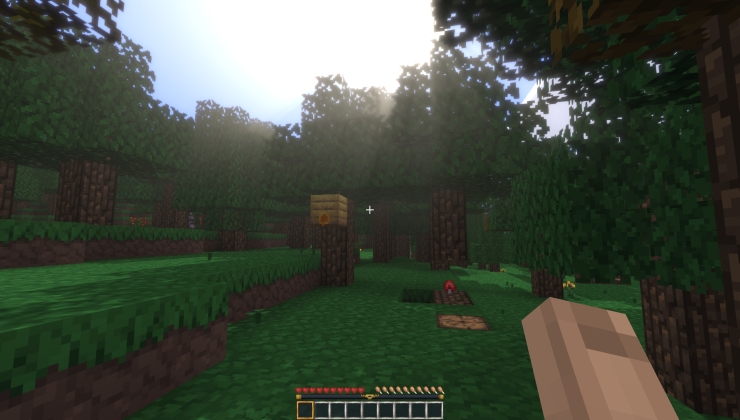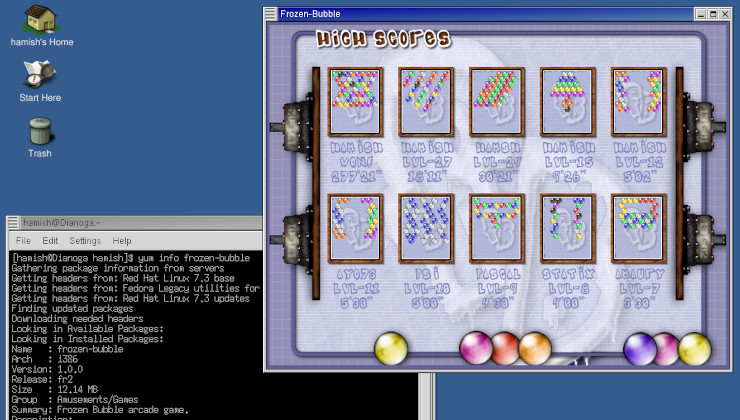A developer for Collabora, the open source consultancy firm that works with the likes of Valve has sent in a Linux Kernel patch aimed at helping Windows games run on Linux through Wine.
From what's noted in the patch titled "[PATCH RFC] seccomp: Implement syscall isolation based on memory areas", which was sent in for gathering comments (RFC = Request for comments), it seems more and more modern Windows applications / games are sidestepping the actual Windows API. The result? It breaks Wine compatibility as "it doesn't have a chance to intercept and emulate these syscalls before they are submitted to Linux".
What they're going for is an addition to the Linux Kernel, to enable them to filter and find out if the calls being done are from Wine itself or from the Windows application being run. They're proposing using the seccomp function, used usually for security purposes but this is in no way a security feature it's just how they're building the functionality for Wine while re-using what's available.
Their new way will avoid some harsh performance penalties too. An existing method would have added a 10% overhead but they say this averages around 1.5% which is a pretty dramatic difference, for something as performance critical as this. Reading over comments and how it's done, it's possible this can help anti-cheat systems too but as always, don't go getting hopes up over early work that's not complete or merged in yet.
You can see the patch here on the mailing list.
The title is a bit weird. like "gets". Nothing is there yet, its just a patch that isn't accepted yet. Interesting stuff though.To get something is to receive something, seems perfectly appropriate. It mentions clearly it's a patch (doesn't say merged or anything) and notes its 'RFC' directly in the title. A title is just a title, the key is as always the text that accompanies it.
Does anyone know of any current use cases for this patch? Which Windows applications/games skip WinAPI calls to do syscalls directly?i think its more to do with all those anticheat and drm protection systems, rather than games itself
To get something is to receive something, seems perfectly appropriate. It mentions clearly it's a patch (doesn't say merged or anything) and notes its 'RFC' directly in the title. A title is just a title, the key is as always the text that accompanies it.
I'm not native english speaker, true. but wouldnt it be better to use "might get" ? :)
i know its request for comments but its not inside the kernel yet lol...
Last edited by Xpander on 1 Jun 2020 at 7:17 am UTC
how is that even possible?
It got the patch, it received it, it hasn't yet done anything with it. The title is factually correct. Splitting hairs at this point. As always, if you have issues it's better to use the correction report system. Edit: However, I have edited to ensure it's as clear as possible.To get something is to receive something, seems perfectly appropriate. It mentions clearly it's a patch (doesn't say merged or anything) and notes its 'RFC' directly in the title. A title is just a title, the key is as always the text that accompanies it.
I'm not native english speaker, true. but wouldnt it be better to use "might get" ? :)
i know its request for comments but its not inside the kernel yet lol...
Last edited by Liam Dawe on 1 Jun 2020 at 7:47 am UTC
Does anyone know of any current use cases for this patch? Which Windows applications/games skip WinAPI calls to do syscalls directly?
The two I read about a little while ago [here](https://bugs.winehq.org/show_bug.cgi?id=48291) were Detroit: Become Human and Red Dead Redemption 2. I saw reference to some other culprits elsewhere, too, but I can't remember which they were right now.
Isn't this to punch holes in the os layer and open up for instabilities, hardware conflicts and massive security issues?
The opposite. It's so that when a Windows application blindly uses Windows system calls on Linux they can be bounced back to Wine to be interpreted properly rather than naïvely followed or dropped. The seccomp framework already exists for trapping system calls, this is just to handle things more sensibly for this use case so that only Windows system calls need processing and Wine system calls can function unmolested. As I understand it.
"sidestepping the actual Windows API. "
how is that even possible?
So, again, just as I understand it from reading bug reports about a game I'm vaguely interested in rather than from any in-depth knowledge, most programs will use some kind of library when they need to make some system calls to make something happen - libc or ntdll.dll, say - but it's also possible to just make system calls directly: libc and ntdll.dll need to be able to make their own system calls, too, of course. Windows and Linux both use the same mechanism for this (I think it's a processor instruction and registers?) but they use different numbers in the registers: that is, they'll both have a system call number 12, but there's no reason for it to necessarily do the same thing. In fact, which thing gets done by each number changes between versions of Windows, so the developers doing this need to check the version of Windows and use a look-up table to generate their numbers.
Isn't this to punch holes in the os layer and open up for instabilities, hardware conflicts and massive security issues?
Usually there is a Change and Release Management process which controls and avoids this kind of issues or criticalities. It's very unlikely that a patch is immediately released just as soon as it is implemented.
+ Click to view long quote"sidestepping the actual Windows API. "
how is that even possible?
So, again, just as I understand it from reading bug reports about a game I'm vaguely interested in rather than from any in-depth knowledge, most programs will use some kind of library when they need to make some system calls to make something happen - libc or ntdll.dll, say - but it's also possible to just make system calls directly: libc and ntdll.dll need to be able to make their own system calls, too, of course. Windows and Linux both use the same mechanism for this (I think it's a processor instruction and registers?) but they use different numbers in the registers: that is, they'll both have a system call number 12, but there's no reason for it to necessarily do the same thing. In fact, which thing gets done by each number changes between versions of Windows, so the developers doing this need to check the version of Windows and use a look-up table to generate their numbers.
That makes sense now! I was confused why Windows syscalls would go through as Linux syscalls directly..
I guess some calls of those programs are tracable by the firejail program, which is able to log the syscalls it is configured to filter.
Presumably it's far wider-reaching than locally debugging a few system calls though. Perhaps this does lay a low-level foundation for future work, like anti-cheat, or just general stability or better compatibility.
I don't know much about this stuff though (which should be obvious from my rambling above). Always interesting to see what happens under the hood!
Reading over comments and how it's done, it's possible this can help anti-cheat systems too but as always, don't go getting hopes up over early work that's not complete or merged in yet.
My reading of it was that they don't want to take an approach that will definitely break their anti-cheat work, rather than that this approach will specifically help.
I'm a bit confused as to why they pushed this patch at all. If they only need to establish whether something is happening in Wine, or in Windows, can't they simply apply their patch to a locally-compiled kernel and test a few of the offending games/apps with that custom kernel loaded?
They've already done that: that's how they have benchmarks on the relative performance of selectively trapping system calls. And while the Wine devs being able to play All The Games might be nice for them, I expect that they'd quite like other Wine users to be able to as well.
The issue is that Windows applications are using Windows system calls without going through Wine. Those system calls won't work, because Linux isn't Windows, and they can't be translated because they don't go through Wine.
They need a solution that will catch (self-modifying and obfuscated) code that doesn't go through Wine and somehow still make it work for all users, without breaking Wine for everything else. For that, it needs to go to the kernel - since that's where the system calls end up - and it needs some discussion to find the best approach, and it needs the kernel devs to agree that it's a good idea. Hence the Request For Comment.
I would say that the game developers have done something pretty manky, but this is the least-bad way of handling it if those games are to be made to be able to run.
Last edited by CatKiller on 1 Jun 2020 at 2:56 pm UTC
I read "the open source conspiracy firm"... :D
Join our global cabal on Github.
Merge our banking ploy into upstream.
Bug #34176 Free Speech will be patched in next release.
:D
+ Click to view long quote"sidestepping the actual Windows API. "
how is that even possible?
So, again, just as I understand it from reading bug reports about a game I'm vaguely interested in rather than from any in-depth knowledge, most programs will use some kind of library when they need to make some system calls to make something happen - libc or ntdll.dll, say - but it's also possible to just make system calls directly: libc and ntdll.dll need to be able to make their own system calls, too, of course. Windows and Linux both use the same mechanism for this (I think it's a processor instruction and registers?) but they use different numbers in the registers: that is, they'll both have a system call number 12, but there's no reason for it to necessarily do the same thing. In fact, which thing gets done by each number changes between versions of Windows, so the developers doing this need to check the version of Windows and use a look-up table to generate their numbers.
Exactly this! on i386 you put the syscall number in the eax register and some other data in other registers depending on the syscall and then you raise the $80 interrupt. On x86_64 they implemented a pure syscall instruction on the CPU.
Here is an old "Hello World" example that calls the sys_write syscall (syscall 4) to write the "hello world" string to stdout and then it calls exit (syscall 1) to let the kernel terminate the "application" with a proper exit code.
.data
s:
.ascii "hello world\n"
len = . - s
.text
.global _start
_start:
movl $4, %eax /* write system call number */
movl $1, %ebx /* stdout */
movl $s, %ecx /* the data to print */
movl $len, %edx /* length of the buffer */
int $0x80
movl $1, %eax /* exit system call number */
movl $0, %ebx /* exit status */
int $0x80Last edited by F.Ultra on 1 Jun 2020 at 11:53 pm UTC
Last edited by TheRiddick on 2 Jun 2020 at 3:47 am UTC











 How to set, change and reset your SteamOS / Steam Deck desktop sudo password
How to set, change and reset your SteamOS / Steam Deck desktop sudo password How to set up Decky Loader on Steam Deck / SteamOS for easy plugins
How to set up Decky Loader on Steam Deck / SteamOS for easy plugins
See more from me